Privatisation Starting to Dominate Election Campaign
Published on 4 july 2014The government's decision was received with mixed feelings by the top players in the run up to the poll on the debate by POP TV commercial station, with the opposition mostly critical of what it sees as a damaging decision for the Slovenian economy.
Zvonko Černač of the Democratic Party (SDS) believes that the government is acting irresponsibly and sending the wrong signals to foreign investors. In the long term, this decision will cause damage to the state and taxpayers, he said.
However, leader of the Social Democrats (SD) Dejan Židan, one of the loudest critics of privatisation in the outgoing cabinet, maintained that it was only right that the government took such a decision.
There are growing indications of opaque dealings related to privatisation, which is why the government had to respond, Židan told the POP TV debate.
Echoing this sentiment, Pensioners' Party (DeSUS) boss Karl Erjavec said that it was only right for the government to freeze proceedings in order for authorities to check for wrongdoing.
Miro Cerar, whose SMC party holds the lead in most polls ahead of 13 July, believes that the assessment of the damage to Slovenia's credibility caused by the decision would have to be made after the election.
The government's decision was criticised by the People's Party (SLS) and New Slovenia (NSi) as sending the wrong message into the world. SLS leader Franc Bogovič said that the government was only affirming its lack of consistency.
NSi leader Ljudmila Novak labelled the move a clear election stunt given prevailing public opposition to privatisation and highlighted that the move was made to the dismay of the finance minister.
The issue was also broached in a separate debate featuring non-parliamentary parties on public broadcaster RTV Slovenija, with most of the participants voicing opposition to privatisation.
SMC representative Milan Brglez voiced the view that he privatisation process must be closely supervised.
Likewise, Igor Šoltes of Believe said that the process must be implemented in line with a clear strategy, while controls must also be implemented over the sale of assets by the bad bank.
Other non-parliamentary parties appearing on the debate expressed more pronounced opposition to the sale of Slovenian companies.
Violeta Tomič of the United Left said the state should instead support worker acquisitions of companies and cooperatives with which workers could obtain control of their companies.
This was echoed by Vlado Čuš of the Greens, who told the RTV Slovenija debate that cooperatives were a means of rescuing the Slovenian economy.
Meanwhile, Zmago Jelinčič of the National Party (SNS) said that Slovenia had missed the opportunity to hand over control of the banks to the people.
Source: The Slovenia Times


